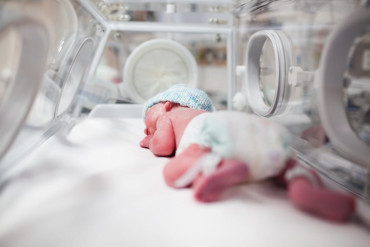Was My Newborn’s Necrotizing Enterocolitis Preventable?

Necrotizing enterocolitis is a painful and potentially deadly condition affecting thousands of newborns yearly. Babies who survive can be left with complications that affect them for the rest of their lives. The underlying cause of necrotizing enterocolitis is still unknown, making treatment challenging. Parents are often left to wonder if anything could have been done differently to spare their children from their pain and suffering.
What Is Necrotizing Enterocolitis?
Necrotizing enterocolitis, often abbreviated as “NEC,” is a serious illness that affects newborns. It occurs when tissue in the large intestine becomes inflamed and can lead to tissue death in a newborn’s colon. In mild cases, this damage is minor and heals on its own. However, in severe cases, portions of the colon may need to be surgically removed. If a large portion of the intestine has died, or if contents of the intestine begin to leak into the rest of the body, death is not uncommon.
Any newborn can get NEC, but it’s most often seen in premature infants within the first two weeks of life. Therefore, the younger the preemie's gestational age, the more likely they will develop NEC. Each child has different symptoms depending on the severity and location of their inflammation and whether the infection has spread through the body. The most common symptoms include:
- bloating or swelling of the abdomen
- greenish-colored fluid in the stomach
- food not moving through the digestive tract
- bloody bowel movements
- labored breathing
- slow heart rate
- lethargy or sluggishness
Can Necrotizing Enterocolitis Be Prevented?
Unfortunately, doctors still don’t know what causes NEC, making prevention difficult. That said, several factors are known to increase a baby’s risk for developing NEC, such as premature birth, feeding or supplementing with cow’s milk-based infant formula, infections in the baby’s intestine, and a difficult birth or low oxygen levels at birth.
Given these known risk factors, the best we can do to reduce a baby’s risk of developing NEC is to ensure expectant mothers receive proper prenatal care, provide medical intervention during difficult births, and breastfeed exclusively whenever possible.
How Is Necrotizing Enterocolitis Treated?
Treatment depends on an infant’s symptoms, age, and overall health. Some common treatments for NEC include:
- stopping feedings
- feeding more slowly with a nasogastric (nose to stomach) tube
- giving IV fluids and nutrition
- giving antibiotics when appropriate
- taking X-rays to monitor how the condition is progressing
- providing oxygen if the baby’s swollen abdomen is interfering with their ability to breathe independently
- surgically removing damaged parts of the intestine
- draining excess fluid out of the abdominal cavity
The consequences can be dire when NEC isn’t identified or treated quickly and appropriately. Even when treated properly, there can be serious long-term consequences. Some of these issues include:
- scars or narrow areas in the intestine, which can lead to painful digestion and blockages throughout the child’s life
- an inability to properly absorb food and nutrients, particularly if large sections of the child’s intestine are removed
- an ostomy, where the baby’s intestine has to be connected to a hole in their abdomen
- sepsis, a severe infection that can affect the entire body
- death
Who Can Be Held Liable When An Infant Develops Necrotizing Enterocolitis?
When a baby is born too soon, the odds are often against them. When they develop necrotizing enterocolitis, their lives are in the hands of their doctors. Unfortunately, because the cause of NEC is unknown at this time, it’s difficult for parents to know if someone is to blame for their child’s pain and suffering. However, suppose it can be shown that a medical professional ignored the signs of NEC or didn't follow generally accepted medical practices when providing treatment. In that case, that practitioner or medical facility may be held accountable for whatever happens to the child in their care.
Corporations may also be held liable if it can be shown that their negligence contributed to a child developing NEC. For example, if a baby formula company promoted their product as having a lower risk of NEC when no such evidence exists.
Why Choose Ross Feller Casey?
If you believe your baby’s NEC was preventable or should have been treated differently, it’s crucial to seek legal help as soon as possible. The attorneys at Ross Feller Casey have extensive experience with these types of cases and are ready to fight for you. We have team of Ivy League-trained doctor-lawyers on staff that understands the complexity of medical malpractice cases, particularly in cases involving necrotizing enterocolitis.
We know the importance of getting the facts of the case as soon as possible and will thoroughly investigate whether your child would have experienced a different outcome if standard medical practices had been adhered to during their treatment. Contact us for a free initial consultation. We handle birth injury cases on a contingency basis, so there’s no fee unless we win your case. Let us help you get the justice that your family deserves.
Disclaimer: Ross Feller Casey, LLP provides legal advice only after an attorney-client relationship is formed. Our website is an introduction to the firm and does not create a relationship between our attorneys and clients. An attorney-client relationship is formed only after a written agreement is signed by the client and the firm. Because every case is unique, the description of awards and summary of cases successfully handled are not intended to imply or guarantee that same success in other cases. Ross Feller Casey, LLP represents catastrophically injured persons and their families in injury and wrongful death cases, providing legal representation in Pennsylvania and New Jersey.





